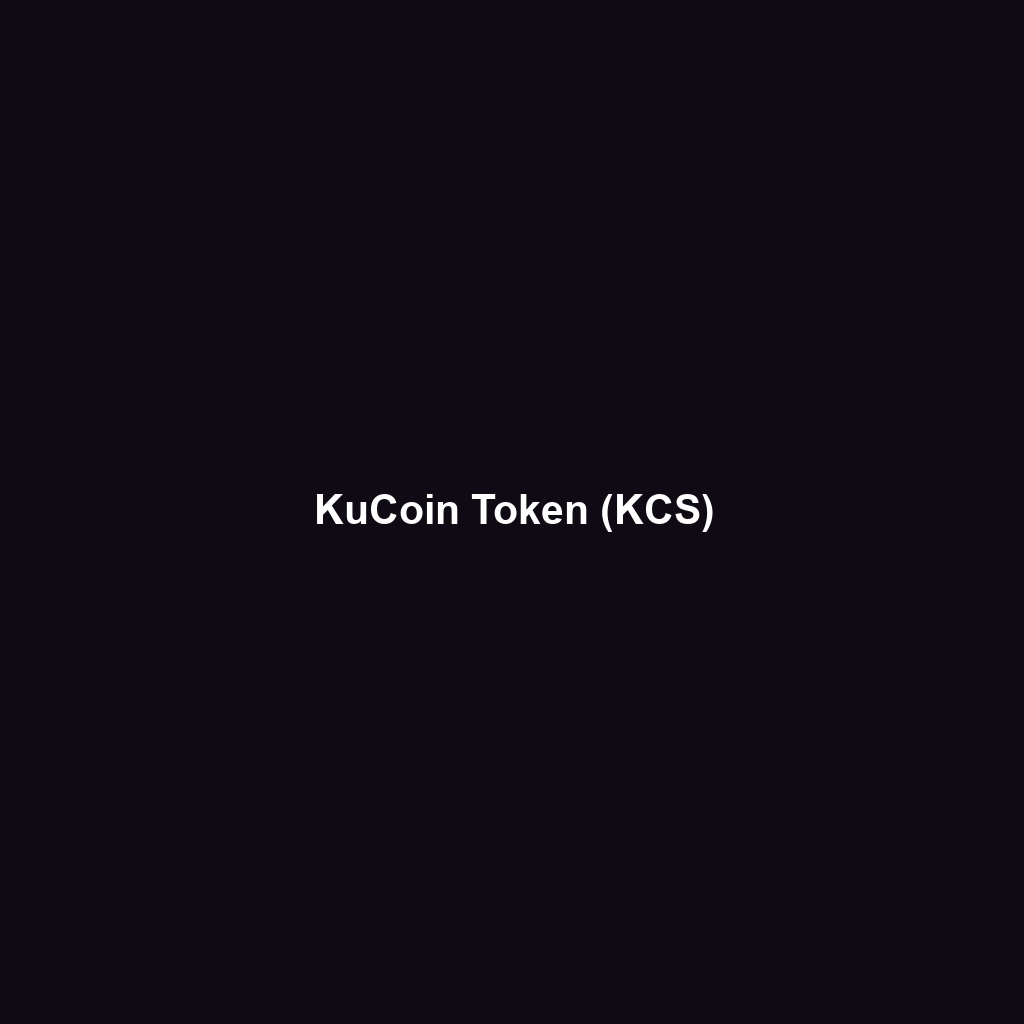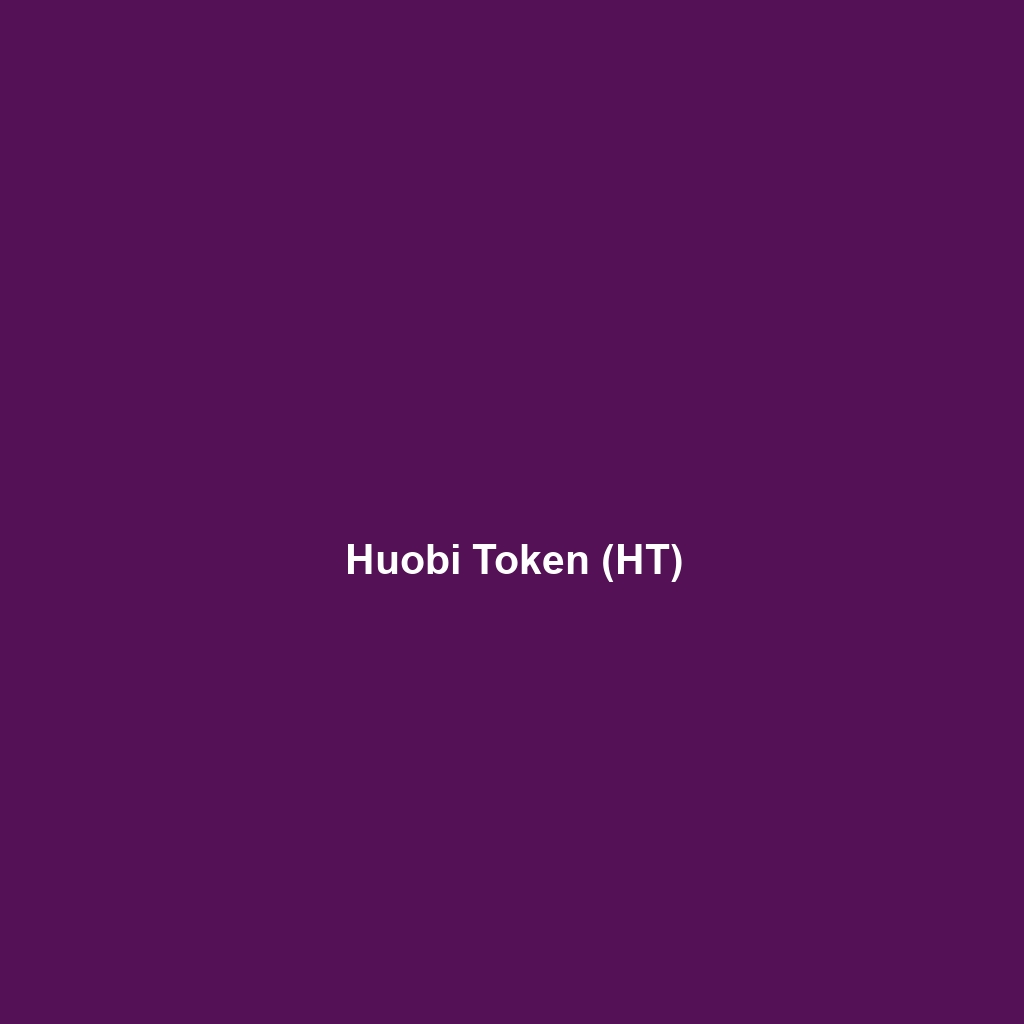Your cart is currently empty!
Tag: Huobi Token

KuCoin Token (KCS)
KuCoin Token (KCS): An In-Depth Analysis
In the rapidly evolving world of cryptocurrency, KuCoin Token (KCS) stands out as a utility token associated with the KuCoin exchange, one of the leading platforms in the digital asset space. This article provides a comprehensive overview of KCS, exploring its history, technology, market performance, and much more.
1. Name and Ticker Symbol
KuCoin Token, commonly abbreviated as KCS, serves as the native utility token for the KuCoin exchange. Launched to enhance user experience and promote growth within its ecosystem, KCS plays an essential role in the platform’s operations.
2. Founders, Launch Date, and History
KuCoin was founded in 2017 by a group of blockchain enthusiasts including Michael Gan, Eric Don, and top engineers from various tech companies. Since its launch, KuCoin has experienced significant milestones, including the introduction of KCS, which was designed to reward loyal users and incentivize trading on the platform. Over the years, KuCoin has expanded its offerings, growing into one of the largest cryptocurrency exchanges worldwide, boasting millions of active users.
3. Blockchain Platform
KCS operates on the internal blockchain of the KuCoin exchange. Rather than being built on external platforms like Ethereum or Bitcoin, it utilizes KuCoin’s proprietary framework to facilitate transactions. This enables high liquidity and seamless trading experiences for users.
4. Purpose and Use Case
The primary purpose of KCS is to enhance user engagement on the KuCoin platform. Its key use cases include:
- Trading Discounts: KCS holders receive discounts on trading fees.
- Profit Sharing: KuCoin allocates 50% of the trading fees back to KCS holders in the form of dividends.
- Investment Opportunities: Users can use KCS to participate in token sales on the StarTrack platform.
5. Technology and Consensus Mechanism
While KCS itself does not operate on a traditional consensus mechanism like Proof of Work or Proof of Stake, it heavily relies on the robust infrastructure of the KuCoin exchange to execute transactions. The platform utilizes advanced trading technologies that facilitate high-frequency trading and maintain cybersecurity protocols.
6. Supply and Tokenomics
KuCoin Token has a maximum supply of 200 million KCS. As of now, the circulating supply hovers around 86 million KCS. A unique aspect of KCS tokenomics is its built-in burn mechanism, where a portion of the tokens is regularly bought back and burned to reduce total supply, thus potentially increasing value over time.
7. Use Cases and Adoption
KCS has a growing number of real-world applications. Major partnerships include collaborations with various DeFi projects and blockchain-based platforms. Several projects use KCS for governance votes and community-related decisions, further enhancing its utility.
8. Market Performance and Metrics
As of late 2023, KCS demonstrated robust market performance with a market capitalization of approximately $800 million. Historical price trends show significant growth since its launch, with occasional volatility reflective of broader market conditions. The trading volume typically exceeds $10 million daily, highlighting active trading engagement among users.
9. Where to Buy and Trade
KCS can be traded on various exchanges, primarily focused on centralized exchanges (CEX) like KuCoin itself, along with platforms such as Huobi and Gate.io. Additionally, it is available on decentralized exchanges (DEX) like Uniswap, providing users with flexibility in their trading choices.
10. Security and Risks
While KuCoin has robust security measures in place, the exchange faced a significant hack in 2020, where approximately $280 million was stolen. Post-incident, KuCoin has enhanced its security framework with insurance funds designated to compensate affected users. However, users should always remain vigilant against phishing attacks and ensure their personal cybersecurity practices are up to date.
11. Community and Governance
KCS utilizes a community-driven governance model where token holders can participate in votes concerning various aspects of the ecosystem, from feature implementations to forming partnerships. The active community is engaged via social media platforms and forums where users share insights and strategies.
12. Competitors and Differentiation
Among its competitorsâ€â€Âlike Binance Coin (BNB) and Huobi Token (HT)â€â€ÂKCS differentiates itself through its unique profit-sharing model. KCS holders enjoy rewards directly linked to the trading volume of KuCoin, providing a compelling reason for traders to hold onto their tokens.
13. Roadmap and Future Developments
Looking ahead, KuCoin plans to introduce new DeFi products and further expand its exchange functionalities. Upcoming developments also include partnerships with Layer 2 scaling solutions to enhance transaction speeds and lower fees.
14. Wallet Compatibility
KCS can be stored in various wallets, including MetaMask, Trust Wallet, and hardware wallets like Ledger to ensure secure holdings for users. Each wallet provides different features, catering to various security and accessibility preferences.
15. Regulatory and Compliance Status
Regulatory challenges remain a significant aspect for KuCoin, with ongoing assessments concerning compliance in various jurisdictions. As regulatory scrutiny increases worldwide, KuCoin is actively working to adapt its operations to meet these legal frameworks.
16. Recent News and Updates
In recent developments, KuCoin announced its collaboration with several DeFi projects to promote the integration of KCS in decentralized financial solutions. Furthermore, the platform has released updates aimed at enhancing user experience, including new trading tools and analytics features.
17. Summary and Call to Action
As one of the pioneering utility tokens in the cryptocurrency market, KuCoin Token (KCS) offers multiple advantages for traders and investors. Its unique profit-sharing model and growing ecosystem present compelling reasons to consider KCS as a valuable asset in your crypto portfolio. With continuous developments and a robust community backing it, KCS is worth following for both seasoned investors and newcomers in the cryptocurrency space.
For additional insights, visit UpCube.net. Also, check out the cryptocurrency’s official website or whitepaper for more information.

Huobi Token (HT)
Huobi Token (HT) – A Comprehensive Overview
Huobi Token (HT) is a cryptocurrency produced by one of the world’s leading digital asset exchanges, Huobi. As a utility token, HT serves a variety of functions within the Huobi ecosystem, empowering users while enhancing the overall trading experience. In this article, we delve into various aspects of Huobi Token, from its inception and technology to its market performance and community involvement.
Founders, Launch Date, and History
Huobi was founded in 2013 by Leon Li, a graduate of Tsinghua University, who initially established the exchange in China. Over the years, Huobi has expanded its global reach, becoming one of the top crypto exchanges worldwide. Highlights in its history include Huobi’s transition to a decentralized model and its token launch in January 2018. With a strong market presence, Huobi has committed to providing secure and efficient trading services.
Blockchain Platform
Huobi Token operates on the Ethereum blockchain, utilizing the ERC-20 token standard. This integration enables HT to leverage Ethereum’s well-established infrastructure and security protocols, while also facilitating a vibrant ecosystem of decentralized applications (dApps). As a layer 1 solution, HT benefits from Ethereum’s robust performance, contributing to its credibility and usability within the crypto market.
Purpose and Use Case
Initially created to incentivize users on the Huobi platform, Huobi Token serves several primary functions, including trading fee discounts, participation in token sales on the Huobi platform, and governance within its ecosystem. Additionally, HT can be used for lending and staking, integrating closely with the decentralized finance (DeFi) landscape.
Technology and Consensus Mechanism
Huobi Token relies on the underlying blockchain technology of Ethereum, which employs a Proof of Work (PoW) consensus mechanism transitioning to Proof of Stake (PoS) with its Ethereum 2.0 upgrade. This provides HT with enhanced security and transaction verification, while Ethereum’s ongoing development addresses scalability and efficiency challenges.
Supply and Tokenomics
The total supply of Huobi Token is capped at 500 million HT. Currently, the circulating supply is approximately 310 million HT, with mechanisms in place to encourage staking and utility usage among holders. Huobi has implemented a burn mechanism that periodically removes HT from circulation during token buybacks, thereby enhancing scarcity and potentially driving value appreciation over time.
Use Cases and Adoption
Beyond its primary role within the Huobi exchange, Huobi Token has real-world applications that extend to various partners in the DeFi sphere. Notable adoption cases include use in trading fee reductions, participating in Huobi’s premium membership services, and enabling users to earn interest through staking programs.
Market Performance and Metrics
Huobi Token has demonstrated remarkable market performance, with a market capitalization often exceeding $1 billion. Its price trends have shown volatility, typical of cryptocurrencies, with significant ups and downs driven by market sentiment and broader crypto market conditions. Trading volumes have remained strong, often ranking HT among the top traded tokens on both centralized and decentralized exchanges.
Where to Buy and Trade
Huobi Token can be traded on various centralized exchanges (CEXs) such as Huobi Global, Binance, and OKEx. Additionally, decentralized exchanges (DEXs) like Uniswap enable users to trade HT without intermediaries, providing liquidity and accessibility for traders worldwide.
Security and Risks
As with any cryptocurrency, HT is not without risks. The platform has experienced security challenges in the past, including hacks that affected exchanges globally. However, Huobi has made substantial investments to enhance security protocols and ensure compliance with regulatory standards, reducing vulnerabilities and instilling user confidence.
Community and Governance
The governance model of Huobi Token is built around community participation, allowing holders to vote on changes proposed within the ecosystem. Huobi has been proactive in engaging its community through social media, forums, and events, fostering transparency and collaboration among users.
Competitors and Differentiation
In the crypto space, Huobi Token faces competition from other exchange tokens such as Binance Coin (BNB) and KuCoin Shares (KCS). HT differentiates itself through its comprehensive support for DeFi services, robust security measures, and a diverse array of use cases within the Huobi ecosystem. Additionally, its competitive fee structure offers users enhanced incentivization compared to rivals.
Roadmap and Future Developments
Huobi continues to innovate, with a roadmap that includes upcoming features such as enhanced DeFi partnerships, improved staking rewards, and further integration with emerging blockchain technologies. Future developments aim to boost user engagement and reinforce its market position.
Wallet Compatibility
Huobi Token is compatible with several digital wallets to facilitate secure storage and transactions. Users can store HT in wallets such as MetaMask, Ledger hardware wallets, and Trezor, providing options for both security and accessibility.
Regulatory and Compliance Status
As regulatory landscapes evolve, Huobi has positioned itself to adhere to compliance mechanisms in various jurisdictions. Legal challenges do exist, notably concerning trading regulations, but the exchange has taken significant strides toward meeting local compliance requirements globally.
Recent News and Updates
Recently, Huobi has announced several strategic partnerships aimed at expanding its service offerings and improving its DeFi capabilities. Additionally, HT has seen updates regarding improved trading functionalities, user experiences, and compliance measures to align with evolving market conditions.
Summary and Call to Action
Huobi Token (HT) presents an attractive option for both seasoned investors and newcomers in the cryptocurrency space. With strong market fundamentals, utility within a leading exchange, and a commitment to innovation, HT is certainly worth following. For those interested in exploring the world of cryptocurrency trading, we recommend keeping an eye on Huobi Token and its developing ecosystem.
For additional insights, visit UpCube.net. For more details, visit Huobi Token’s official website.